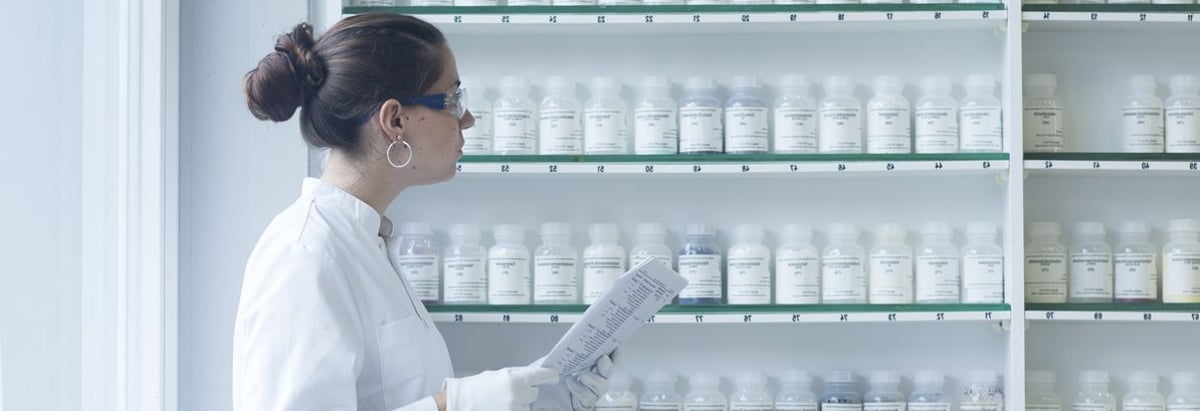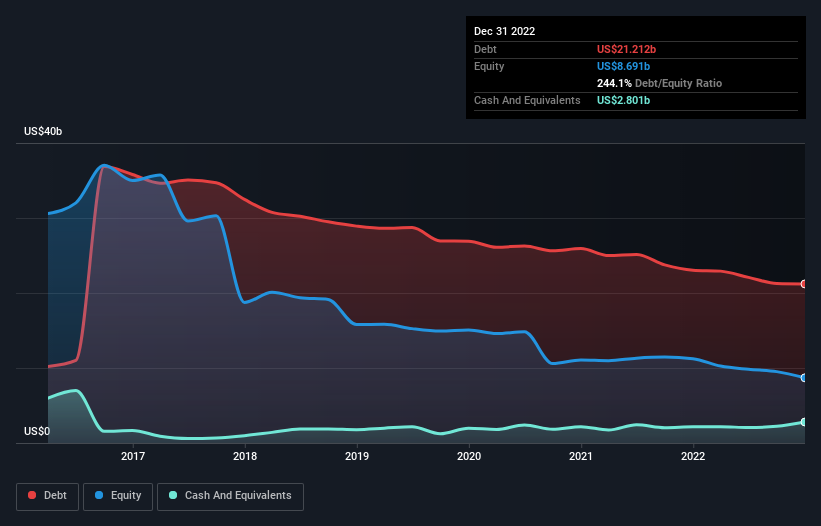
The external fund manager backed by Berkshire Hathaway's Charlie Munger, Li Lu, makes no bones about it when he says 'The biggest investment risk is not the volatility of prices, but whether you will suffer a permanent loss of capital.' So it seems the smart money knows that debt - which is usually involved in bankruptcies - is a very important factor, when you assess how risky a company is. We note that Teva Pharmaceutical Industries Limited (NYSE:TEVA) does have debt on its balance sheet. But the real question is whether this debt is making the company risky.
When Is Debt Dangerous?
Debt is a tool to help businesses grow, but if a business is incapable of paying off its lenders, then it exists at their mercy. Ultimately, if the company can't fulfill its legal obligations to repay debt, shareholders could walk away with nothing. However, a more usual (but still expensive) situation is where a company must dilute shareholders at a cheap share price simply to get debt under control. Of course, debt can be an important tool in businesses, particularly capital heavy businesses. When we examine debt levels, we first consider both cash and debt levels, together.
View our latest analysis for Teva Pharmaceutical Industries
What Is Teva Pharmaceutical Industries's Net Debt?
The image below, which you can click on for greater detail, shows that Teva Pharmaceutical Industries had debt of US$21.2b at the end of December 2022, a reduction from US$23.0b over a year. However, it does have US$2.80b in cash offsetting this, leading to net debt of about US$18.4b.

A Look At Teva Pharmaceutical Industries' Liabilities
We can see from the most recent balance sheet that Teva Pharmaceutical Industries had liabilities of US$11.5b falling due within a year, and liabilities of US$23.8b due beyond that. On the other hand, it had cash of US$2.80b and US$3.70b worth of receivables due within a year. So it has liabilities totalling US$28.8b more than its cash and near-term receivables, combined.
The deficiency here weighs heavily on the US$11.2b company itself, as if a child were struggling under the weight of an enormous back-pack full of books, his sports gear, and a trumpet. So we'd watch its balance sheet closely, without a doubt. After all, Teva Pharmaceutical Industries would likely require a major re-capitalisation if it had to pay its creditors today.
In order to size up a company's debt relative to its earnings, we calculate its net debt divided by its earnings before interest, tax, depreciation, and amortization (EBITDA) and its earnings before interest and tax (EBIT) divided by its interest expense (its interest cover). Thus we consider debt relative to earnings both with and without depreciation and amortization expenses.
Teva Pharmaceutical Industries's debt is 4.6 times its EBITDA, and its EBIT cover its interest expense 2.9 times over. This suggests that while the debt levels are significant, we'd stop short of calling them problematic. Investors should also be troubled by the fact that Teva Pharmaceutical Industries saw its EBIT drop by 14% over the last twelve months. If things keep going like that, handling the debt will about as easy as bundling an angry house cat into its travel box. There's no doubt that we learn most about debt from the balance sheet. But it is future earnings, more than anything, that will determine Teva Pharmaceutical Industries's ability to maintain a healthy balance sheet going forward. So if you want to see what the professionals think, you might find this free report on analyst profit forecasts to be interesting.
Finally, a business needs free cash flow to pay off debt; accounting profits just don't cut it. So we clearly need to look at whether that EBIT is leading to corresponding free cash flow. Looking at the most recent three years, Teva Pharmaceutical Industries recorded free cash flow of 22% of its EBIT, which is weaker than we'd expect. That weak cash conversion makes it more difficult to handle indebtedness.
Our View
We'd go so far as to say Teva Pharmaceutical Industries's level of total liabilities was disappointing. And furthermore, its interest cover also fails to instill confidence. After considering the datapoints discussed, we think Teva Pharmaceutical Industries has too much debt. That sort of riskiness is ok for some, but it certainly doesn't float our boat. While Teva Pharmaceutical Industries didn't make a statutory profit in the last year, its positive EBIT suggests that profitability might not be far away. Click here to see if its earnings are heading in the right direction, over the medium term.
Of course, if you're the type of investor who prefers buying stocks without the burden of debt, then don't hesitate to discover our exclusive list of net cash growth stocks, today.
Valuation is complex, but we're here to simplify it.
Discover if Teva Pharmaceutical Industries might be undervalued or overvalued with our detailed analysis, featuring fair value estimates, potential risks, dividends, insider trades, and its financial condition.
Access Free AnalysisHave feedback on this article? Concerned about the content? Get in touch with us directly. Alternatively, email editorial-team (at) simplywallst.com.
This article by Simply Wall St is general in nature. We provide commentary based on historical data and analyst forecasts only using an unbiased methodology and our articles are not intended to be financial advice. It does not constitute a recommendation to buy or sell any stock, and does not take account of your objectives, or your financial situation. We aim to bring you long-term focused analysis driven by fundamental data. Note that our analysis may not factor in the latest price-sensitive company announcements or qualitative material. Simply Wall St has no position in any stocks mentioned.
About NYSE:TEVA
Teva Pharmaceutical Industries
Develops, manufactures, markets, and distributes generic and other medicines, and biopharmaceutical products in the United States, Europe, Israel, and internationally.
Very undervalued with reasonable growth potential.
Similar Companies
Market Insights
Community Narratives




